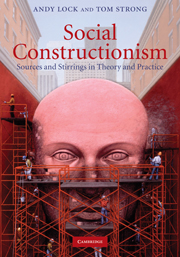Book contents
- Frontmatter
- Contents
- Preface
- Acknowledgements
- 1 Introduction
- 2 Giambattista Vico
- 3 Phenomenology
- 4 Hermeneutics
- 5 Marxism and language
- 6 Lev Vygotsky
- 7 Meanings and perspectives
- 8 Ludwig Wittgenstein
- 9 Gregory Bateson
- 10 Sociologies – Micro and Macro
- 11 Sources of the self
- 12 Michel Foucault and his challenges
- 13 Discourse analysis
- 14 Ken and Mary Gergen
- 15 Rom Harré
- 16 John Shotter
- 17 Concluding remarks
- Bibliography
- Index
17 - Concluding remarks
Published online by Cambridge University Press: 05 June 2012
- Frontmatter
- Contents
- Preface
- Acknowledgements
- 1 Introduction
- 2 Giambattista Vico
- 3 Phenomenology
- 4 Hermeneutics
- 5 Marxism and language
- 6 Lev Vygotsky
- 7 Meanings and perspectives
- 8 Ludwig Wittgenstein
- 9 Gregory Bateson
- 10 Sociologies – Micro and Macro
- 11 Sources of the self
- 12 Michel Foucault and his challenges
- 13 Discourse analysis
- 14 Ken and Mary Gergen
- 15 Rom Harré
- 16 John Shotter
- 17 Concluding remarks
- Bibliography
- Index
Summary
The greater part of reality-maintenance in conversation is implicit, not explicit. Most conversation does not in so many words define the nature of the world. Rather, it takes place against the background of a world that is silently taken for granted.
(Berger and Luckmann, 1991[1967]: 172)We noted in our introduction that social constructionism is a broad church. The sources we have presented as stirring up the central tenets of constructionism – attempts to elucidate meaning-making, both how it is done and what it does – confirm that breadth, and make it clear that a definitive summing up here is a futile task. That said, we still see a great deal of value and rich possibility coming from the ideas we have trawled through. The nineteenth-century debates – the Methodenstreich – as to whether a human science compatible with physical science is possible are not just still unresolved, but perhaps unresolvable. But we do see a richer, almost hybrid, form of investigation and practice that has been signalled by the explorations since that debate.
From where we have been looking, we see some problems in the received academic paradigm of psychology. The first is its omission of the fact that people have (inter)subjective experiences, and that these experiences are central to human activity. Coupled with this subjectivity, people have a tacit grasp, from the inside, as to what it is like to be human. ‘Scientific’ psychology has developed as a body of theory that almost totally ignores this.
- Type
- Chapter
- Information
- Social ConstructionismSources and Stirrings in Theory and Practice, pp. 343 - 354Publisher: Cambridge University PressPrint publication year: 2010



